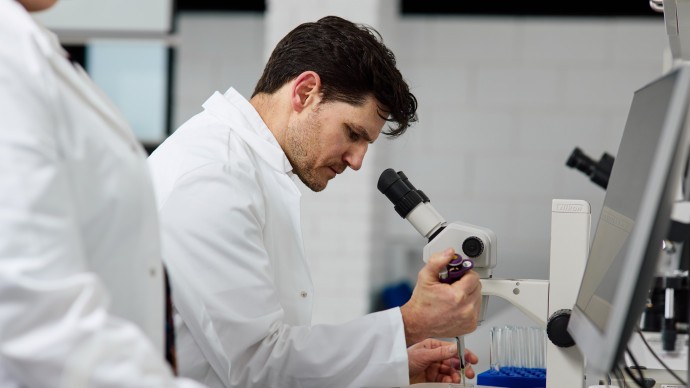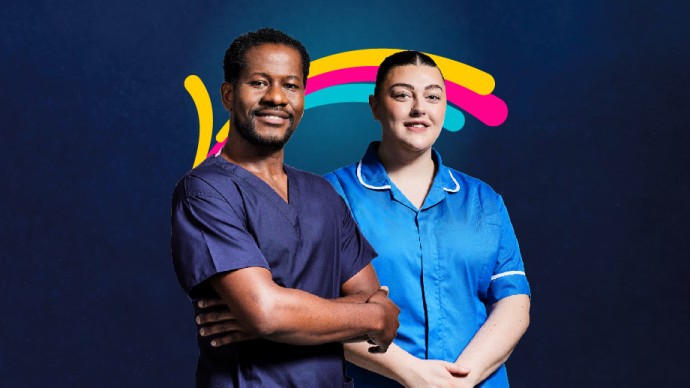Leading the way for new life
Leading the way for new life

Standfirst
The formation of Manchester Metropolitan University can be traced back to the establishment of the Manchester Mechanics’ Institute in 1824, which taught artisans the basic principles of science.
200 years later, true to its roots, the University continues to deliver training in the discipline. This piece highlights the work of reproductive scientists who are leading the way in creating new life.
Main story
It was 1978 when the first IVF baby, Louise Brown was born in Manchester. Now, over 40 years later, the city continues to be a major fertility hub in the UK.
Manchester Metropolitan University plays a pivotal role in this as the only formal training provider in the country for the clinical scientists who go on to work in fertility clinics across the country as embryologists and andrologists.
An exclusive partnership
The University has been the exclusive NHS partner to train reproductive scientists since 2013. The Master of Science course is led by Dr Michael Carroll and is part of the Scientist Training Programme.
Over 200 students have qualified since it began with graduates going on to work in fertility clinics, some in industry, while others continue to conduct important research that will inform future treatments.
Additionally, Manchester Metropolitan University is the sole provider of the research element of Higher Specialist Scientist Training for reproductive science.
This is the only programme in the UK leading to a clinical doctorate in embryology and reproductive science. For those qualified as clinical scientists, this is the next level of training towards becoming a consultant.
Dr Helen Hunter, who is the Head of Laboratory at Manchester Fertility and a visiting senior lecturer on the MSc course at the University was one of the first to go through this programme.
After five years of advanced clinical training, Dr Hunter is one of only three people in the country to have achieved this clinical doctorate in the field of reproductive science.
15% of the world's population is infertile. In the UK, one in six couples will have difficulty conceiving.
The need for embryologists and andrologists is high. This is due to an increased demand for fertility treatment.
Globally, fertility levels are declining. Figures from the World Health Organisation indicate that about 15% of the population is infertile. In the UK, one in six couples will have difficulty conceiving.
In 2021, 55,000 patients had IVF treatment across clinics in the UK. Many reasons may lead individuals or couples to have IVF.
One is that women are leaving it longer to have their first child. After the age of 35, the number of eggs and the quality of those eggs start to decline. Another factor is sperm. Studies over the past 40 years show that the number of sperm produced by men has dropped by about 60%.
Increasing treatments
There is an increased use of fertility treatments across family types.
Patients in heterosexual relationships accounted for 90% of all IVF patients in 2021. The number of IVF patients in female same-sex relationships increased by 33% between 2019 and 2021 and the number of single patients increased by 44% in the same timeframe.
IVF gives options and hope to those wanting to start a family, but it does not guarantee a baby. Success rates are linked to age at the time of treatment.
Women aged 35-37 have a 32% chance of a live birth and this drops to 5% once a woman is over 40. However, improvements in clinical and laboratory practice have led to the overall pregnancy rate across all ages increasing from 10% in 1991 to 29% in 2021.
This highlights the vital role that high standards of training and research play in supporting advancements in the field.
Key stats
Main story continued
Active learning environments
Dr Carroll emphasised the importance of both active and problem-based learning, delivered by simulating the clinical environment.
He explained: “It sets students up to become a competent clinical scientist and to deal with problems that can arise. In clinical science anything can happen, and you must be ready and able to respond, or it could jeopardise the whole treatment cycle. So, we make sure that students have the experience to deal with that.”
Another strength of the training is the long-established link with St Mary’s Hospital on Oxford Road in Manchester, which is where Dr Carroll trained as an embryologist before becoming a lecturer.
St Mary’s has its own place in putting Manchester on the map in the development of reproductive medicine. Founded in the mid-1980s, it was the first ever NHS IVF clinic, and to this day it remains the sole NHS-only provider of treatment.
Some days it's the best job in the world. Some days, it's the worst when you have to give bad news. It doesn’t work for everyone.
When the Master of Science course was first established, Dr Carroll worked alongside Professor Daniel Brison, the scientific director in the Department of Reproductive Medicine at St Mary’s Hospital to develop the teaching for the programme and establish a teaching team.
This means that students learn from practising scientists and clinicians from across the UK as well as academics. It provides students with a very broad perspective in the field of reproductive science. The partnership with St Mary’s also enables collaboration on research projects that students can participate in to further enhance their learning.
Dr Carroll regularly reviews the programme to ensure that the curriculum is future-proofed and brings in various aspects of clinical science with guest speakers delivering short lectures. This gives students a breadth of knowledge that they will use once qualified including genomic counselling to understand the role that genetic abnormalities play in infertility.
Students also learn how to communicate sensitively with patients. As the guardians of embryos in the early stages of development, embryologists are the contact point with patients up to the point when the embryo is transferred into the mother’s womb.
An emotionally charged procedure
Dr Hunter explained: “Some days it’s the best job in the world and some days the worst when you have to give bad news because it doesn’t work for everyone.
“As an embryologist, you must have some emotional detachment. There are so many steps leading up to an embryo transfer and there being a baby at the end – you can’t get too excited.”
For those that do make it to embryo transfer, it is an emotionally charged procedure that embryologists are present for.
She added: “The emotion in the room can be overwhelming, this is when it becomes very real. It is lovely to know when someone has a successful pregnancy, especially if they have had lots of treatment and it is nice to follow their progress and of course have a squish of the baby.
“We get a lot of personal thanks from patients. It’s a really satisfying job if you can help someone along that journey, whatever the outcome is. You have done your bit in understanding why it is not working and supporting them through difficult times.”
Over eight million babies have been born since the introduction of IVF and it all started here in Manchester.
As the University births the next generation of scientists, future generations of IVF babies will be born. Marking the realisation of a dream for many and maintaining Manchester as the centre for excellence in clinical reproductive science education in UK.
-
![Baby Evie looking over her mother's shoulder]()
The baby girl born from IVF
Find out more
Listen to our podcast

MetCast: how we transform health
Find out more about our exclusive NHS partnership in our podcast, MetCast.About 200 years
Manchester Met celebrates two centuries of driving progress through excellent education and research.
-
![200 years 1824-2024]()
200 years
Find out more -
![Two nurses standing together and smiling]()
Transforming health
Find out more



